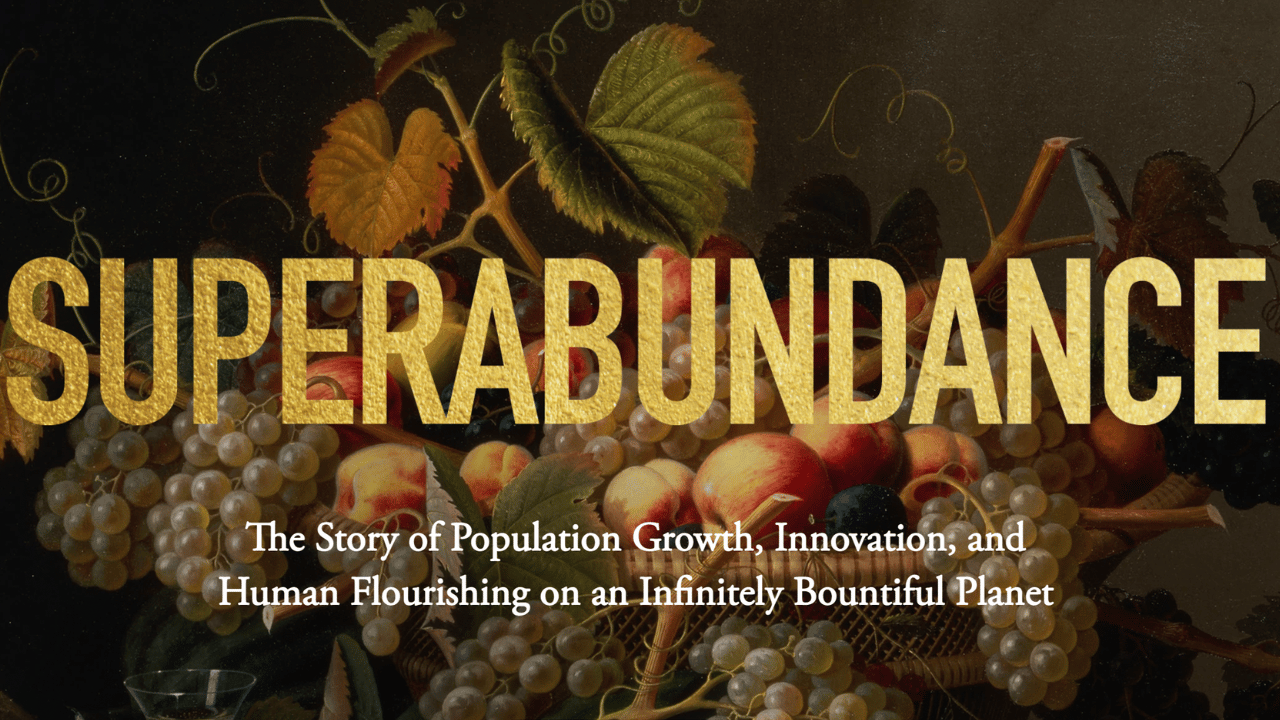The following is a summary of Superabundance: The Story of Population Growth, Innovation, and Human Flourishing on an Infinitely Bountiful Plant by Marian L. Tupy and Gale Pooley, reprinted with permission.
In the first part of this book, the human propensity toward the negative is contrasted with the generally improving state of the world. Instead of the apocalypse that humanity has been expecting since the dawn of time, the world has seen great progress. One of the persistent sources of concern about the present state of the world and the future of humanity is population growth. Some people fear this might lead to the exhaustion of resources, thus ending in a calamity for the planet and the species that inhabit it. But there are many reasons why that need not be the case.
In the second part of the book, the concern over population growth and resource abundance is put to an empirical test using the Tupy-Pooley Resource Abundance Framework (see below). The framework uses a new methodology to measure the change in abundance relative to the change in wages. It includes two levels of analysis: a personal level and a population level. To use a pizza analogy, personal resource abundance measures the size of a slice of pizza per person. Population resource abundance measures the size of the entire pizza pie.
Looking at hundreds of commodities, goods, and services spanning two centuries, the authors found that abundance almost invariably grew, often substantially. In general, personal resource abundance grows by more than 3 percent per year, thereby doubling every 20 years or so. The population resource abundance analysis showed that resources have been growing more abundant by more than 4 percent per year, thereby doubling every 16 years or so. Moreover, it showed that humanity is experiencing “superabundance,” a condition where abundance is increasing at a faster rate than the population is growing.
Put differently, the data suggest that a growing population tends to benefit, rather than impoverish, humanity. That vindicates University of Maryland economist Julian Simon’s observation that “Our supplies of natural resources are not finite in any economic sense. Nor does past experience give reason to expect natural resources to become scarcer. Rather, if history is any guide, natural resources will progressively become less costly, hence less scarce, and will constitute a smaller proportion of our expenses in future years.”
In the third part of this book, some of the main reasons for the growth in abundance are examined. Unlike nonhuman animals, people flourish by developing sophisticated ways of cooperating and gaining knowledge. Not only do humans trade more intensively and extensively than other species; more importantly, they constantly innovate. It is innovation that distinguishes relatively slow Smithian growth (a process of adding more people, land, and capital to production processes) from the relatively fast Schumpeterian growth (a process of economic expansion powered by technological change).
The process of innovation, however, can be disruptive and thus threatening to the status quo. As a result of that problem, innovation has tended to be discouraged or even snuffed out by powerful people. Over time, however, geopolitical competition has compelled institutions in some Western European countries to become more economically and politically inclusive. There were also coterminous revolutions in Western European thought and ethics, especially ordinary people’s attitudes to innovation and commerce. It was chiefly these fortuitous developments that allowed human ingenuity to shine, thereby freeing an ever-growing share of the world’s population from relative stagnation and the Malthusian trap.
Unfortunately, the reasons for human flourishing—liberalism (in its original European sense, not its current American sense), openness, and inclusivity—are neither widely known nor appreciated. Some of humanity had hardly begun to experience historically unprecedented improvements in longevity, nutrition, education, and so on, before competing ideas of human flourishing emerged. Throughout the 19th century and well into the 20th, extreme nationalism (including a variety of racist, imperialist, and fascistic doctrines) and socialism (including communism, Maoism, and national socialism) competed with liberalism for world supremacy. One by one, challenges to liberalism were defeated or discredited.
The anti-liberal vacuum was gradually and increasingly filled by an extreme form of environmentalism. No doubt, some readers will object that the harm done by environmental extremism cannot be compared to the destructiveness of prior anti-liberal ideologies, yet it is impossible to deny that monomaniacal commitment to extreme forms of environmentalism could lead to gross human rights abuses, as happened in China and India. The ideology of extreme environmentalism is anti-natalist, anti-humanist, anti-growth, and anti-progress. Most worryingly, extreme environmentalism is growing more radical, as befits its role as an increasingly popular form of a secular religion.
In conclusion, superabundance depends on two main components: people and freedom. People who are free to think, speak, read, publish, and interact with others will generate ideas, and their market-tested ideas will lead to progress. The more people the planet has and the more freedom they enjoy, the greater the likelihood that new good ideas will be generated to tackle current and future problems.
For superabundance to endure, humanity needs to avoid making at least three serious mistakes. First, we must avert population collapse brought about by the unchecked spread of anti-humanist and anti-natalist ideas, which are already impacting parental choices in much of the world. Fewer people equal fewer ideas, and fewer ideas equal slower progress. Second, we must defend the freedom of expression against speech codes and cancelations. Free speech is the only means by which new and potentially beneficial ideas can spread and contribute to human flourishing. Third, we must defend the freedom of the market from overregulation and undue restrictions. The marketplace is the most efficient generator of useful knowledge ever devised by humanity because it allows us to separate valuable inventions from the valueless. Let us continue to use it to our advantage.































